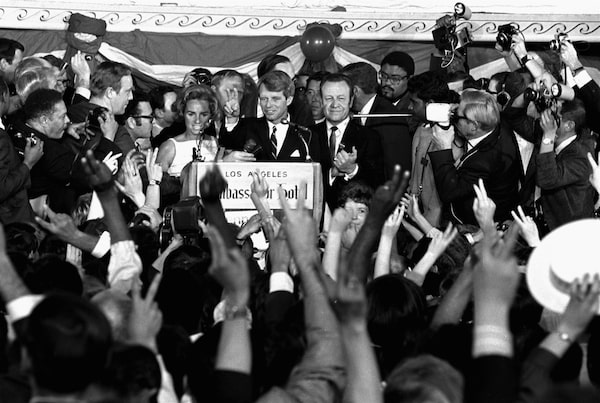Sirhan Sirhan, right, accused assassin of Sen. Robert F. Kennedy walks with his attorney Russell E. Parsons in June, 1968, in Los Angeles. Prosecutors for the first time are not opposing Mr. Sirhan's release, who has been in prison since 1968.The Associated Press
An investigator, Michael McCowan, once asked Robert Kennedy’s assassin, Sirhan Sirhan, a question: Instead of shooting him from behind, why didn’t you do it face on?
“Because that son of a bitch turned his head at the last second,” Mr. Sirhan replied.
Mr. Sirhan, who hated Mr. Kennedy for his support of Israel, was sentenced to death by gas chamber for the 1968 murder, but four years later a California Supreme Court ruling temporarily abolished capital punishment. Mr. Sirhan was spared. Now, a two-member parole board hearing has recommended he be set free.
As Maxwell Taylor Kennedy, one of Kennedy’s sons, reminds us, parole was rejected at the last hearing in 2016. The board stated Mr. Sirhan showed no remorse, was unrepentant and didn’t even appear to understand the gravity of his crime. As Maxwell Kennedy wonders, what changed?
His father could still be alive today. RFK would be 96.
Not just him, but maybe tens of thousands met their death because of Mr. Sirhan. There’s a good chance Mr. Kennedy, whose assassination followed that of Martin Luther King just two months earlier, would have won the presidency in 1968 and ended, as he had promised, the Vietnam War. Mr. Sirhan, a Palestinian nationalist, obliterated that possibility and paved a path for Richard Nixon.

Sen. Robert F. Kennedy addresses campaign workers moments before being shot on June 5, 1968, in Los Angeles. At his side are his wife, Ethel, and his California campaign manager, Jesse Unruh, speaker of the California Assembly.Dick Strobel/The Associated Press
The times were marked by social and racial upheaval, streets burning. The country’s emotional condition was one that gave vent to rage and hatred. It is worth recalling because the United States today has a similar psychological atmosphere, as most exemplified by the Jan. 6 pillaging of the country’s citadel of democracy.
As seen in the Canadian election campaign, some of the fury has seeped north. It is not nearly as bad, but the malice, the viciousness and the death threats of the far right as seen at Justin Trudeau’s rallies are not something to which the country has often bore witness.
Although the U.S. was terribly divided in the 1960s, there was a surge of hope and idealism that Mr. Sirhan’s .22 caliber handgun ended. He crushed the spirit of a generation, tore a hole in its heart.
Today, idealism from the forging of heroic political protagonists seems next to impossible. The seething polarization of politics intensified by hate-filled social-media platforms has seen to that. While what the Kennedys – RFK and JFK – represented has been overromanticized, and much of it is myth, they stirred as much hope as anyone since.
Post-Sirhan, some feel the progressive trajectory of the country was never the same. “That was when I broke down,” civil rights activist Andrew Young has recalled. “I think that the rational liberal democratic socialist view of the world, from Franklin Roosevelt all the way to Lyndon Johnson, was really cut short by the assassinations of Martin Luther King and Robert Kennedy.”
Canada’s progressive path continued. In those times, Expo 67 and the arrival of the northern magus, Pierre Trudeau, engendered patriotic fervour. To gauge the measure of what Mr. Sirhan did, imagine if it was Mr. Trudeau who was cut down in that spring of 1968, allowing his chief rival, staid businessman Robert Winters, to take his place.
Would there even be a country? Mr. Trudeau’s strength in standing up to René Lévesque may have saved it. Without him there would be no Charter of Rights and Freedoms. By contrast to his sanctimonious son, Pierre Trudeau gave the country backbone.
He faced down demonstrators when they hurled projectiles at him on the eve of the 1968 election. On other occasions, he gave them the finger. To the FLQ terrorists there was “Just watch me.” To picketing workers at Parliament, “Mangez de la merde.”
There was a big price for his defiance. He alienated the West, left Quebec out of the new Constitution and needlessly antagonized legions. Some regard Justin Trudeau as divisive. Compared with his father, he is a puppy.
In Canada and the U.S., fury and frenzy are now the province of the retrograde right. Mr. Trudeau and Conservative leader Erin O’Toole have condemned the extremists. They need to do it more.
In the U.S. there is little chance of the rage subsiding. There is no leader on the horizon to stir hope. Mr. Sirhan, the last assassin – we can only hope he is – took away the last idealist.
A full parole board and the California governor must still approve his freedom. His crime was too calamitous, his remorse too absent, for it to be deserved. His last breath should be taken behind bars.
Keep your Opinions sharp and informed. Get the Opinion newsletter. Sign up today.
 Lawrence Martin
Lawrence Martin